Key takeaways:
- Smart contracts automate agreements directly through code on blockchain technology, eliminating intermediaries and enhancing efficiency.
- The security and transparency of smart contracts reduce concerns about fraud, making transactions more trustworthy.
- Cryptocurrency, as a decentralized form of digital money, empowers individuals, especially in underbanked regions, by providing access to financial services.
- Creating effective smart contracts requires careful attention to coding, as mistakes can lead to significant financial losses.
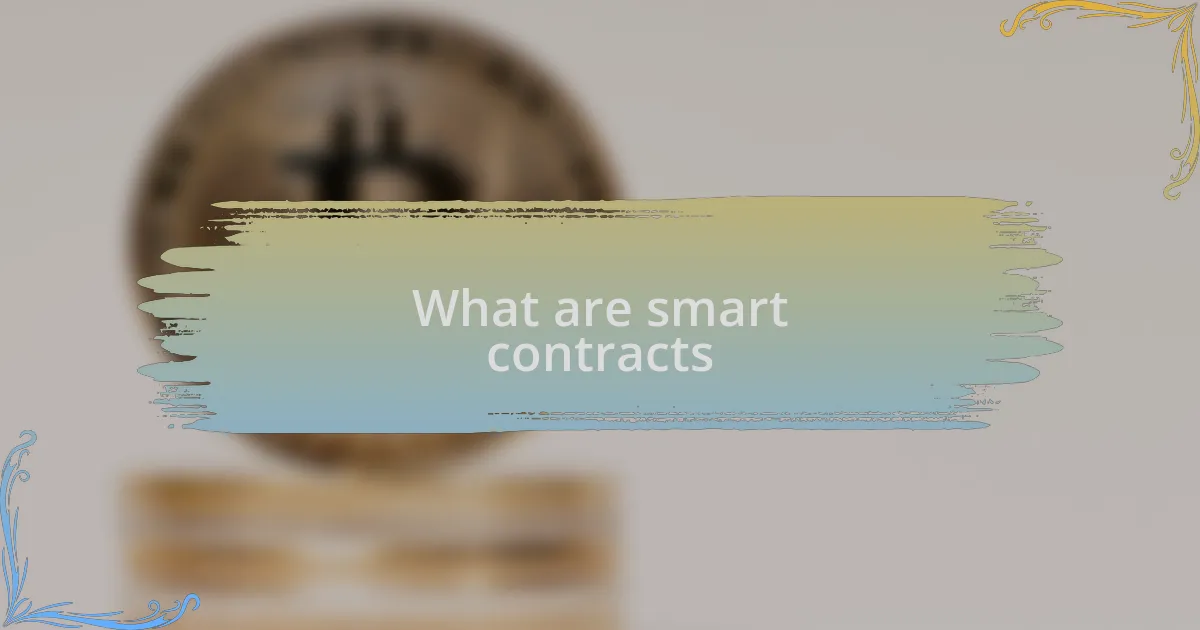
What are smart contracts
Smart contracts are essentially self-executing agreements with the terms of the contract written directly into code. Imagine you set up a game where if one player scores a goal, a reward is automatically given without needing a referee. That’s the beauty of smart contracts; they eliminate the need for intermediaries, making transactions faster and more efficient.
When I first encountered the concept of smart contracts, it felt like discovering a hidden cheat code for the world of agreements. I remember thinking, “Wow, this could change everything!” The ability for a digital contract to execute automatically made me realize just how much trust we can place in technology today.
These contracts operate on blockchain technology, which means they are secure and tamper-proof. Have you ever been worried about the potential dishonesty involved in traditional contracts? With smart contracts, that concern is significantly reduced, as the code enforces the terms without the chance for manipulation. It’s like having an impartial friend who ensures everyone sticks to the game’s rules!
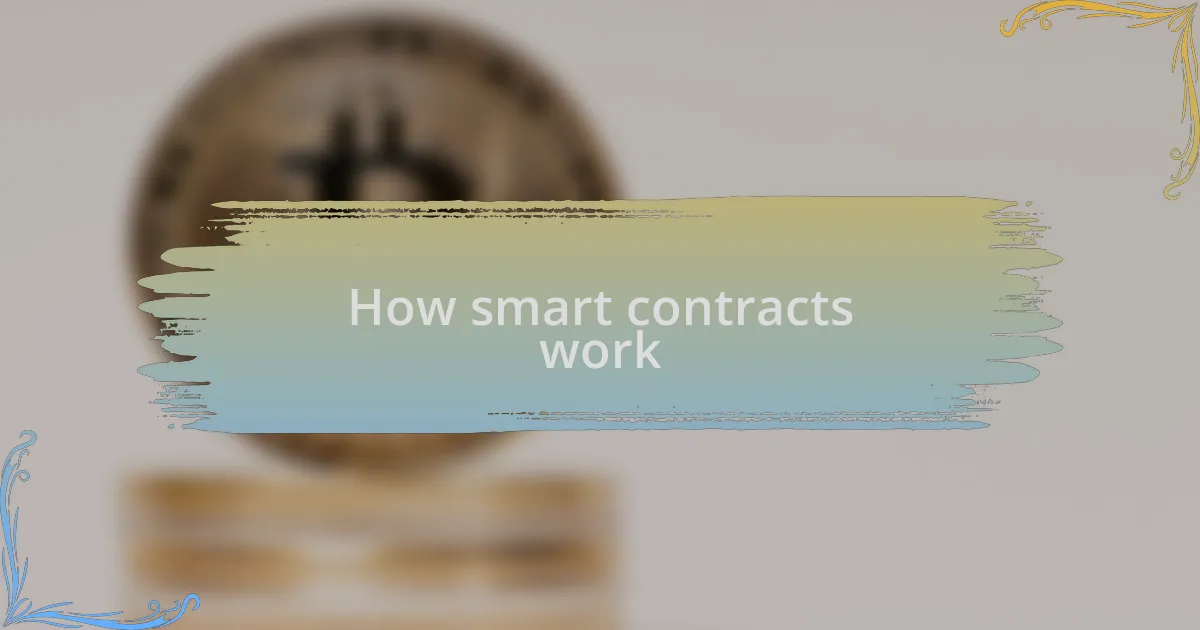
How smart contracts work
To understand how smart contracts work, think of them as digital vending machines. When you insert money and select a snack, the machine automatically delivers your choice without the need for a cashier. Similarly, smart contracts automatically execute their terms when certain conditions are met. This seamless process fascinated me when I first witnessed it; it felt like watching a magic trick where the rules were fair and transparent.
Behind the scenes, smart contracts run on blockchain technology, which ensures every action is securely recorded and immutable. This means once the code is deployed, it can’t be changed or tampered with. I remember my first attempt at writing a simple smart contract. I felt nervous yet excited—like I was filling out the biggest test of my life. Seeing it work, I was filled with disbelief that something I coded could actually operate independently and reliably.
When conditions are fulfilled, smart contracts execute automatically, like the click of a button. For instance, in a digital game, if the player fulfills the requirements for a reward, the contract dispenses it instantly. I often find myself asking, “Can I trust technology to handle my agreements?” My experiences have shown me that when properly coded, these contracts offer an unprecedented level of trust and efficiency that traditional methods struggle to match.
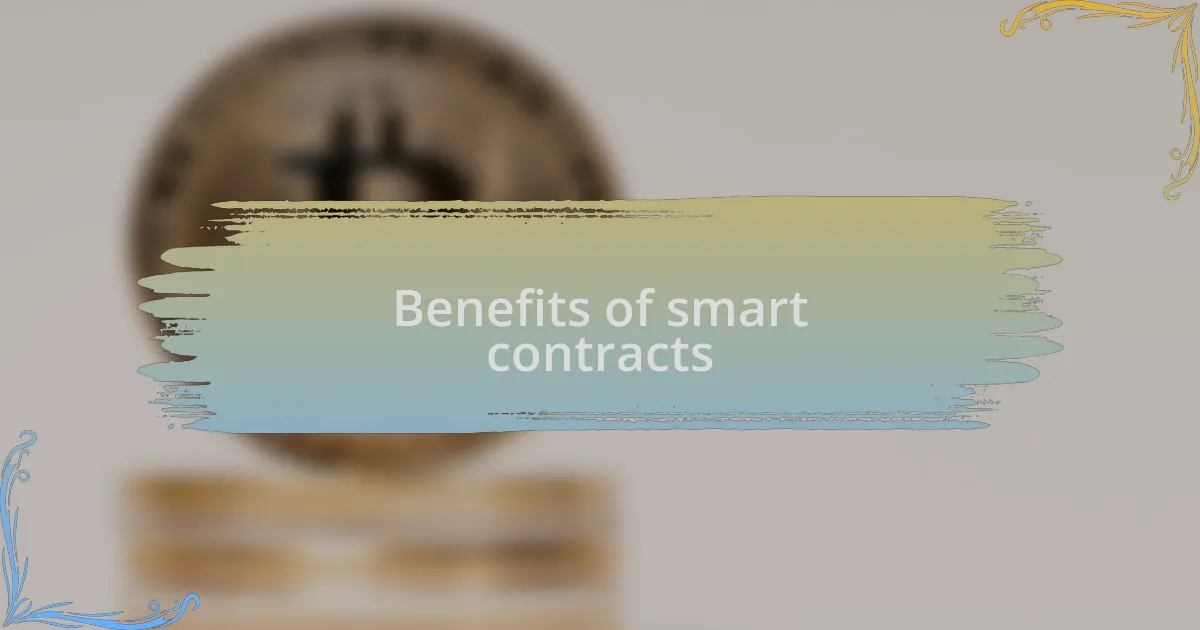
Benefits of smart contracts
One of the biggest benefits of smart contracts is their ability to eliminate the middleman. When I first learned about this feature, I was amazed by the idea of cutting out unnecessary steps and costs in transactions. Imagine not needing a lawyer or an escrow agent—everything is managed by the code itself, which minimizes fees and saves time. How cool is that?
Another advantage is the enhanced security offered by smart contracts. They protect against fraud and unauthorized changes, thanks to their blockchain foundation. I remember feeling a sense of relief when I realized that the agreements I’d made could not be altered after being deployed. That level of security is like having a vault that keeps my digital promises safe and sound. Can you think of how that might change the way we view contracts?
Lastly, the transparency embedded in smart contracts is a game-changer. Every participant can see the terms and track the activities without needing permission or special access. When I first participated in a project using smart contracts, I felt empowered knowing that I could easily verify what was happening at every stage. It truly fosters a sense of trust, doesn’t it?

Introduction to cryptocurrency
Certainly! Here’s the content for the “Introduction to cryptocurrency” section:
Cryptocurrency is essentially digital money that exists online, unconfined by the traditional banking system. I recall the excitement I felt when I first encountered Bitcoin—an entirely new way of thinking about money. It was as if I had discovered a world where anyone could participate in the economy without the limitations imposed by banks or governments.
At its core, cryptocurrency operates on blockchain technology, which is like a digital ledger that records all transactions securely and transparently. When I learned that every transaction is verified by a network of computers rather than a single authority, it made me appreciate the decentralized nature of this system. What an interesting concept: could this shift the way we view trust and security in financial transactions forever?
One of the most fascinating aspects is how cryptocurrencies empower individuals, especially in underbanked regions. When I read stories about people using cryptocurrency to access funds or make transactions where banking services are limited, it really touched my heart. Isn’t it incredible to think that this technology can open doors for so many, giving them more control over their finances and future?
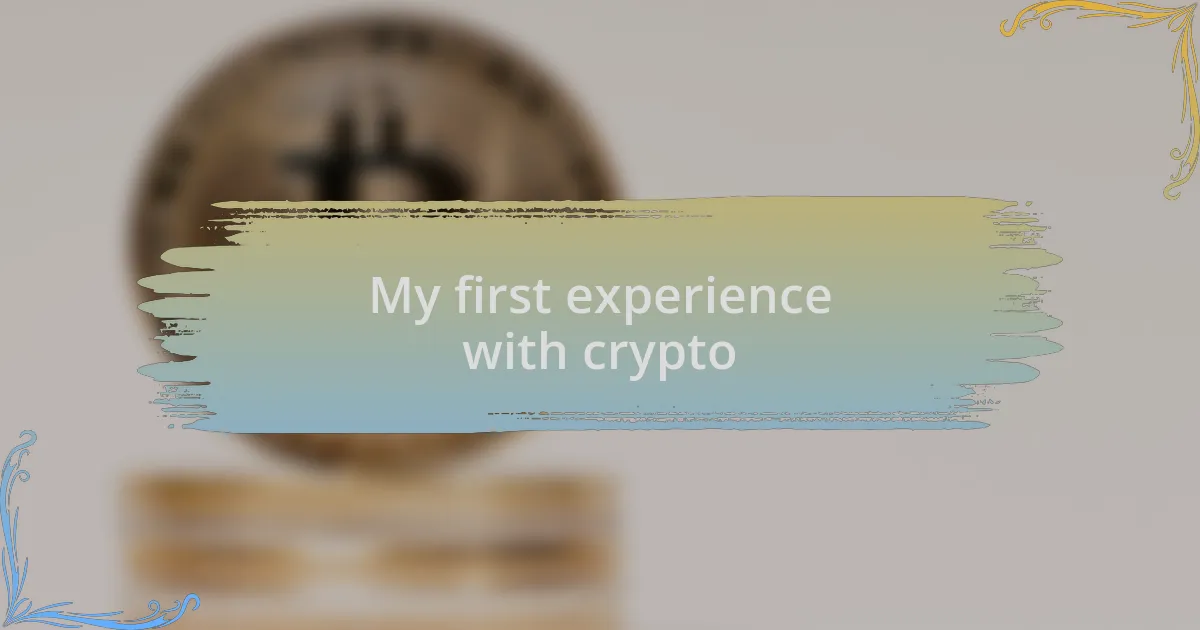
My first experience with crypto
When I first stumbled upon cryptocurrency, it was through a friend who eagerly shared his excitement about Bitcoin. I remember the puzzled look on my face as he explained how this digital currency worked. It felt surreal to think that my money could exist entirely online, free from the control of banks. Could something like that really change how we use money every day?
Later, I decided to dip my toes in and purchased a small amount of Bitcoin. I vividly recall sitting at my computer, feeling a mix of nervousness and exhilaration as I clicked the “buy” button. I wondered if I had just made a wise decision or if I was about to face a huge loss. That moment taught me not only about the potential of crypto but also about my own willingness to embrace uncertainty.
As I learned more, my initial fears transformed into curiosity. I found myself exploring various cryptocurrencies and their unique features. The more I delved into the community and met others who shared my interests, the more I realized I was part of something much bigger. Isn’t it amazing how a simple digital transaction can spark such a sense of belonging?
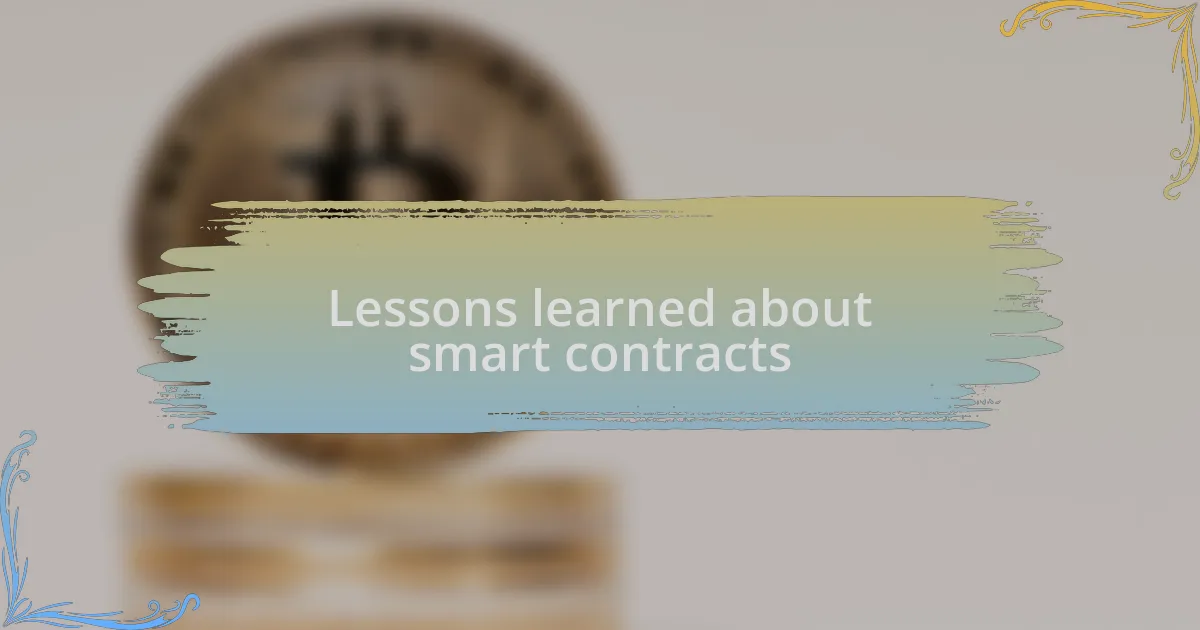
Lessons learned about smart contracts
One of the most significant lessons I learned about smart contracts is their ability to automate agreements without middlemen. The first time I set up a smart contract for a small project, I felt a sense of empowerment as I realized I could create a system where trust was built into the code itself. This experience made me appreciate just how transformative technology can be—not just for transactions, but also for promoting transparency.
As I navigated through different platforms that offered smart contract capabilities, I came across the idea of “if-then” statements. For example, if a certain condition is met in a game, then the player automatically wins a reward. This concept clicked for me, illustrating how rules could be executed instantly and fairly. Have you ever wished for a world where commitments are upheld automatically? That’s exactly what smart contracts aim to achieve, and it’s exciting to think about the possibilities this creates.
Another eye-opening realization was the importance of understanding how fragile smart contracts can be. I remember hearing about a project that lost millions due to a simple coding oversight. This taught me that while smart contracts can handle complex tasks efficiently, the initial programming must be spot-on. It’s a powerful reminder that responsibility and diligence in creating these agreements are crucial; mistakes in the digital realm can have real-world consequences.